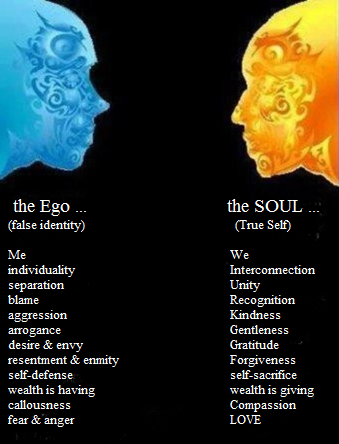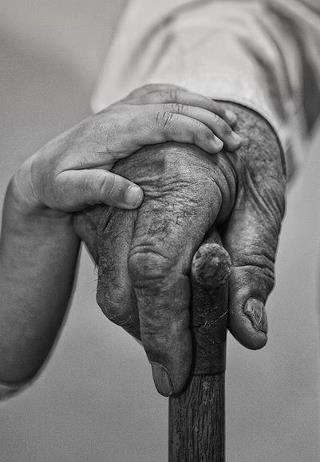Chapter 08: Dealing with personal Identity
The eighth major divergence between the three Zones of Being has to do with the different ways their members view themselves & their own willpower. Keeping this theme in mind, consider humbly pondering (and maybe courageously enlivening) the following …
*First & foremost, Zone 1 advocates see their ego as an immovable reality of their being; the fundamental facet of self that cannot be removed or even significantly diminished. These are the people who have seemingly fallen in love with themselves; the ones who willingly soak in their habits & addictions; the ones who repeatedly strive to obtain the greatest accumulation of wealth &/or the grandest experiences of pleasure or comfort. In a slightly evolved vein, Zone 2 acolytes see the ego as an enemy that needs to be defeated (or at least significantly tamed) in order to one day attain “enlightenment.” These people strive to identify and delve into a deep understanding of their weaknesses, desires, fears, &/or addictions in order to thereby sublimate the same. Of course, their inevitable failure to do so successfully is thereafter often excused with a weak-willed “I’m only human” or an erroneous “We must learn to embrace our shadow-side” – two patent falsehoods that quite effectively serve to keep many of their proponents trapped in the self-focused sufferings of Zone 2 s realm of faux-enlightenment.
In outstanding contrast to both of the aforementioned belief systems, Zone 3 enthusiasts interact with the ego quite differently – namely, treating it as an agent of empowerment to be harnessed, and therefore as a friend to be embraced. This is not a call to either sadism or masochism; not a summons to submit to selfish impulses that harm others or oneself. Rather, this mindset simply understands that the ego cannot be defeated using the same mentality that enlivened it in the first place – that the ego is purely self-focused and strife-based, and thus can only be effectively engaged by consciously harnessing the same; by openly (& gratefully) using its exclusively selfish impulses to empower choices that are boldly selfless instead. Indeed, it is the difficult decisions in life that always prove most powerful, and thus it is the ego’s desire to prevent us from self-sacrificing for others that provides those same choices with their phenomenal efficacy.
Indeed, any paradigm of thought that sees the ego as an enemy encourages us to attack and suppress the same, a choice which inspires the ego to defend itself and encourages it to become stronger. And yet, when we recognize the ego at work, thank that ego for its well-intended (yet no longer needed) assistance, and then consciously use its resistance to empower our concurrent acts of Kindness, the ego becomes an empowerer, and eventually a friend … Whenever we are emotionally reacting to any stimulus or situation, we embody the ego. And it is important to recognize this intrinsic facet of self. We can coddle to its demands (and live a Zone 1 life of selfish “sin”), we can repeatedly reject its desires (and live a Zone 2 life of futility – repeatedly “getting better” only to crash again & again into the “failure” of selfishness), or we can form a Zone 3 alliance with that ego by using it to strengthen every act of Kindness we engage when least inclined to do so.

“Make your ego thin to self and porous to others. Remember that your will regarding yourself – your hopes, your dreams, your complaints, your fears – is nothing. Just as important, remember that your will regarding others – their hopes, their dreams, their suffering, their fears – is everything. Be accordingly.” ~ inspired by Rainer Maria Rilke
*While Zone 1 proponents believe that their personal will is ultimately too weak to effectively combat their more primal instincts (and sometimes even advocate enlivening those subconscious desires for their own personal benefit), Zone 2 followers feel that the regular employment of one’s personal will (via manipulating one’s environment, correcting one’s associates, &/or chastising oneself) is necessary for the ego to ever be tamed or mastered or dismantled. In strong contrast, Zone 3 enthusiasts agree that the will must indeed be regularly engaged in order to transcend the selfish whims of the ego, and those same supporters of selflessness know full well that the human will is more than potent enough to accomplish that all-important task. Where they differ – and differ dramatically – from their Zone 2 counterparts is how they employ their will; doing so not to combat the ego or attempt to destroy it, but rather to harness the ego’s innate potency via consciously subverting its selfish designs by boldly replacing them with flagrantly selfless alternatives.

*Whereas Zone 1 affiliates subscribe to the limiting mantra of “I am who I am” (i.e. that they are inevitably hampered by the primitive inclinations of their cellular memories & permanently limited by the constraints imposed upon them by the circumstances of their birth and upbringing), Zone 2 acolytes prefer to succumb to the myth of “I am who I could one day become” (i.e. that life is about perpetually – and ultimately futilely – striving to learn and “grow” and “improve” as a person, in order to one day exude a mostly constant expression of one’s “higher self”). Zone 3 venturers, on the other hand, recognize neither of these delusions, preferring instead to honor and actualize the far more potent Truth of “I always fully am who I am currently choosing to be” – and this, regardless of their inborn genetic predispositions, early psychological indoctrinations, or present day cultural pressures. The influences from our past (both those stemming from “past lives” as well as those soaked in current circumstance) do indeed tempt us to make less-than-noble decisions, and as such it is indeed true that selfless choices are often very difficult ones to make. That being said, Zone 3 enthusiasts know firsthand that those same selfless choices are always available, and that – whenever they are courageously enlivened – those same selfless choices always rule the day.

“Our vision does not become clear by gazing into our own hearts, but rather solely during fully immersed moments of emotional bravery … It is true that everything that irritates us about others inevitably leads to a better understanding of ourselves, just as everything that irritates us about ourselves ultimately leads to a fuller understanding of others, and yet neither of these dynamics of elevated perception can bear any real clarity until they become reborn in kind word more than humble thought and caring deed more than mere kind word.” ~ inspired by Carl Jung




 ;
;